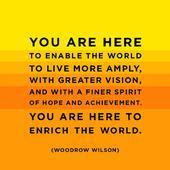Breakpoint & Beyond - Mastering the Future Today
by George Land
http://www.speaking.com/articles_html/GeorgeLand_526.html
The survival and success of a business depends on its ability to adapt to its changing environment. How can we equip ourselves and our organizations to deal with the world that is transforming right before our very eyes? The key is to understand the NEW rules of change. Today`s change is not just more rapid, more complex, more turbulent, and more unpredictable. Today`s change is unlike any encountered before. The surprising fact is that change itself has changed! By looking to our greatest teacher, Mother Nature, we can understand the natural change process. The ceaseless process of change takes on unique characteristics at different points in time. The rules governing change shift dramatically and almost without notice. These "Breakpoint" shifts follow the same master pattern whether they occur within a single atom, one`s personal life, or an entire organization.
Three phases of growth, called the Transformation Theory, define the life of any system over time. The first phase is very disorderly, creative and unpredictable as it strives to define its pattern. Energy is spent on trial and error. Once the bits and pieces of the pattern are assembled in a healthy system, then an abrupt change - a breakpoint - happens where the rules shift 180 degrees. An atom in water reaches breakpoint when the temperature reaches boiling point and its new environment becomes steam. An inventor reaches breakpoint once a prototype is marketable and is ready for production.
In phase two, experimenting ceases and the approach switches to extending, improving, and modifying the central pattern while discarding what does not fit. In fact, anything that does not fit the pattern will be rejected by the system. By standardizing policies and procedures, an organization efficiently grows larger in its second phase. When an organization has used up its potential in the environment, it reaches another breakpoint. Nature`s method of growth moves ahead, attempting to fulfill the potential of the growing organism. Many of today`s current management systems have reached this breakpoint.
In the third phase, the pattern is restructured and the new configuration must include elements that were rejected in the second phase. Disordering, reordering, and innovating all make up the method of change in the third phase. In organizations, the third phase demands new and desparate behaviors such as innovating, partnering with customers and suppliers, taking on community and environmental responsibility.
Understanding and working with the cycle of change can revolutionize the way one does business. However, understanding change is not enough to guarantee success. The unique interrelationship between vision, creativity, and connection is required to ensure the continued growth and success of an organization.
Shared Vision and Pull. What is the vision for the future? It is critical that everyone in the organization have an understanding of the vision. In nature, every one of the more than 60 trillion cells in the human body shares the same vision of the whole - the same DNA. Cells know where they are going, and in the process, can course-correct. In organizations, the shared common vision becomes the driving force, and decisions are not "by the book" but by the vision. The pull of the future always takes precedence over the past.
Creativity. Creativity allows you to bring into being things that never existed before and could not be predicted by the past. If decisions are based on the past, you will only create roadblocks and never realize your vision. Organizations that have a vision not only share it but encourage creativity and innovation from their employees to help build it.
Connection. We are connected inexorably to one another. We are all part of an interconnected whole, and any energy we spend putting up walls is swimming upstream against nature, and is going to cost us in stress, pain and the quality of our lives. It is non-judgmental respect or "unconditional love" for all employees that allows organizations to make major strides in fulfilling their vision.
For those who insist on clinging to traditional ways of looking at the world, change will continue to come so fast and in such unexpected forms that the future will no longer be a desirable place. But for those who are willing to move ahead with conscious awareness of the natural laws of change, the future offers unparalleled opportunity to reshape our lives, our organizations, and our world, into what we want.
http://www.speaking.com/articles_html/GeorgeLand_526.html
Thursday, May 21, 2009
Subscribe to:
Post Comments (Atom)



No comments:
Post a Comment